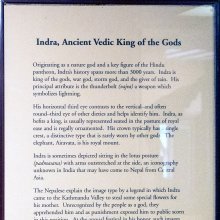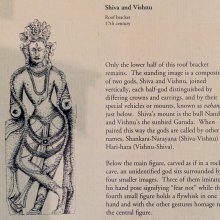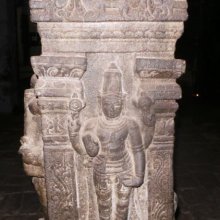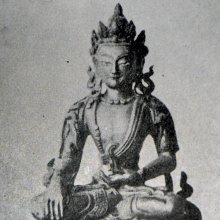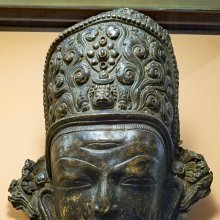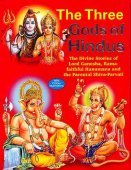God: 6 definitions
Introduction:
God means something in Buddhism, Pali, Hinduism, Sanskrit, Jainism, Prakrit, Hindi. If you want to know the exact meaning, history, etymology or English translation of this term then check out the descriptions on this page. Add your comment or reference to a book if you want to contribute to this summary article.
Images (photo gallery)
(+317 more images available)
In Hinduism
Natyashastra (theatrics and dramaturgy)
Source: Shodhganga: Elements of Art and Architecture in the Trtiyakhanda of the Visnudharmottarapurana (natya)Gods (in Indian dramas) should be presented as “brave and courageous”, as dictated by the Dhīroddhata classification of Heroes (nāyaka), according to the Viṣṇudharmottarapurāṇa, an ancient Sanskrit text which (being encyclopedic in nature) deals with a variety of cultural topics such as arts, architecture, music, grammar and astronomy.—In the Viṣṇudharmottarapurāṇa, it is narrated that Gods should be dhīroddhata i.e., brave and courageous.

Natyashastra (नाट्यशास्त्र, nāṭyaśāstra) refers to both the ancient Indian tradition (shastra) of performing arts, (natya—theatrics, drama, dance, music), as well as the name of a Sanskrit work dealing with these subjects. It also teaches the rules for composing Dramatic plays (nataka), construction and performance of Theater, and Poetic works (kavya).
Shilpashastra (iconography)
Source: Shodhganga: Elements of Art and Architecture in the Trtiyakhanda of the Visnudharmottarapurana (shilpa)Gods refers to a certain class of personalities which follows specific guidelines in the tradition of ancient Indian Painting (citra), according to the Viṣṇudharmottarapurāṇa, an ancient Sanskrit text which (being encyclopedic in nature) deals with a variety of cultural topics such as arts, architecture, music, grammar and astronomy.—In the Viṣṇudharmottarapurāṇa, the rules of Painting of different classes have been elaborately discussed. In the picture of group of gods, faces of different creatures having different weapons and different kinds of dresses should be painted. Thus, it is established that even in the pictures; the people belonging to different class and profession were projected with specific attire [e.g., group of Gods] so that general people can equate the picture with the practical character.

Shilpashastra (शिल्पशास्त्र, śilpaśāstra) represents the ancient Indian science (shastra) of creative arts (shilpa) such as sculpture, iconography and painting. Closely related to Vastushastra (architecture), they often share the same literature.
General definition (in Hinduism)
Source: Shodhganga: Elements of Art and Architecture in the Trtiyakhanda of the Visnudharmottarapurana (h)God’s form cannot be seen (i.e., no one can see Him with the eyes), according to the Śvetāśvetaropaniṣad.—The concept of the vedī or a ground for offering materials specifically to God of worship emerged in the Vedic era. Again after making the vedī, the concept of idol worship came into existence. In the Śvetāśvetaropaniṣad, it is said that the form of God cannot be seen i.e., no one can see Him with the eyes. This may be the reason behind the generation of the concept of idol. It is stated in the Śrīmadbhagavadgītā that persons having body find difficulty while worshipping the formless. Thus it appears that in the Vedic period to Upaniṣadic period, the practice of idol worship was not in a prominent place as well as the need of temple building like present day was not in vogue.
In Buddhism
Tibetan Buddhism (Vajrayana or tantric Buddhism)
Source: ORA: Amanaska (king of all yogas): (Tibetan Buddhism)The Gods (in Sanskrit: Deva) can be controlled by one having the Siddhi (power) of Speech, according to verse 14.24bd-27 of the Laghuśaṃvara, an ancient Buddhist Yoginī Tantra.—Accordingly: “The Sādhaka [who has] the Siddhi of speech can certainly attract a king or queen by [merely] thinking [it]. He quickly controls gods (deva), demons and men. When angry, he can kill with his speech and drive away his adversary. The practitioner can thus effect a curse with his speech [...]”.

Tibetan Buddhism includes schools such as Nyingma, Kadampa, Kagyu and Gelug. Their primary canon of literature is divided in two broad categories: The Kangyur, which consists of Buddha’s words, and the Tengyur, which includes commentaries from various sources. Esotericism and tantra techniques (vajrayāna) are collected indepently.
In Jainism
General definition (in Jainism)
Source: The University of Sydney: A study of the Twelve ReflectionsA God cannot stop the soul going at the moment of death, as discussed in Bhūdhardās’s composition dealing with the twelve reflections (bhāvanā or anuprekṣā), also found in the Tattvārtha-sūtra.—Accordingly, “[all things are impermanent]—King, prince or emperor, an elephant’s mahout: everyone dies someday each at his own time. (1) [there is no shelter] Powerful friends, a goddess or a god, mother, father, family: they can do nothing to stop the soul going at the moment of death. (2) [cycle of rebirth] So poor you cannot meet the cost, you suffer. You are entranced by the desire for wealth. Nowhere in saṃsāra will you find happiness no matter where you look in the world. (3) [...]”.

Jainism is an Indian religion of Dharma whose doctrine revolves around harmlessness (ahimsa) towards every living being. The two major branches (Digambara and Svetambara) of Jainism stimulate self-control (or, shramana, ‘self-reliance’) and spiritual development through a path of peace for the soul to progess to the ultimate goal.
Languages of India and abroad
Hindi dictionary
Source: DDSA: A practical Hindi-English dictionaryGod in Hindi refers in English to:—(nf) lap; —[ka] in the lap; very young; —[dena] to give away for adoption; —[bharana] to be blessed with motherhood; to fill the lap of a woman with auspicious articles (like cocoanut, etc.); —[lena] to adopt (a child); —[suni hona] to lose the only child..—god (गोद) is alternatively transliterated as Goda.
...
See also (Relevant definitions)
Starts with (+324): God-pilu, Goda, Goda-lagnu, Goda-manel, Goda-otu, Goda-vaj, Godaa, Godaapadi, Godaasilo, Godaavari, Godabani, Godabari, Godabe, Godabi, Godabolya, Godachali, Godachi, Godaci, Godacigannu, Godada.
Ends with: Abode of God, Cloud god, Crown god, Fire God, Hangod, Kasaragod, Khre rgod, Nagod, Pagod, Phrag rgod, Rongod, Shirgod, Snergod, Spra-rgod, Sun-god.
Full-text (+14369): Devadeva, Deva, Indra, Agni, Devata, Aditya, Yama, Daivata, Vibudha, Devadhideva, Rudra, Amara, Ishvara, Dhanvantari, Ananga, Daiva, Daivika, Kubera, Devatideva, Shakra.
Relevant text
Search found 460 books and stories containing God; (plurals include: Gods). You can also click to the full overview containing English textual excerpts. Below are direct links for the most relevant articles:
The Gods of the Egyptians Vol 1 (by E. A. Wallis Budge)
Maha Prajnaparamita Sastra (by Gelongma Karma Migme Chödrön)
Appendix 5 - The atheist and theist aspects of buddhism < [Chapter IV - Explanation of the Word Bhagavat]
VI.2. Recollection of gods of native purity < [VI. Recollection of the Deities (devatānusmṛti)]
Appendix 4 - The brahmanical trimūrti (Śiva, Viṣṇu and Brahmā) < [Chapter IV - Explanation of the Word Bhagavat]
Soma in Vedic Mythology and Ritual (study) (by Anjana Chakraborty)
The Chaldean account of Genesis (by George Smith)
The Skanda Purana (by G. V. Tagare)
Chapter 30 - Eminence of Agni Tīrtha < [Section 3 - Arbuda-khaṇḍa]
Chapter 52 - The Commanding Peak of the Mountain < [Section 3 - Arbuda-khaṇḍa]
Chapter 9 - The Rise of Bhava < [Section 2 - Vastrāpatha-kṣetra-māhātmya]
A History of Indian Philosophy Volume 1 (by Surendranath Dasgupta)
Part 8 - The Vedic Gods < [Chapter II - The Vedas, Brāhmaṇas And Their Philosophy]
Part 4 - The Saṃhitās < [Chapter II - The Vedas, Brāhmaṇas And Their Philosophy]
Part 22 - Jaina Atheism < [Chapter VI - The Jaina Philosophy]
Related products
(+24 more products available)
